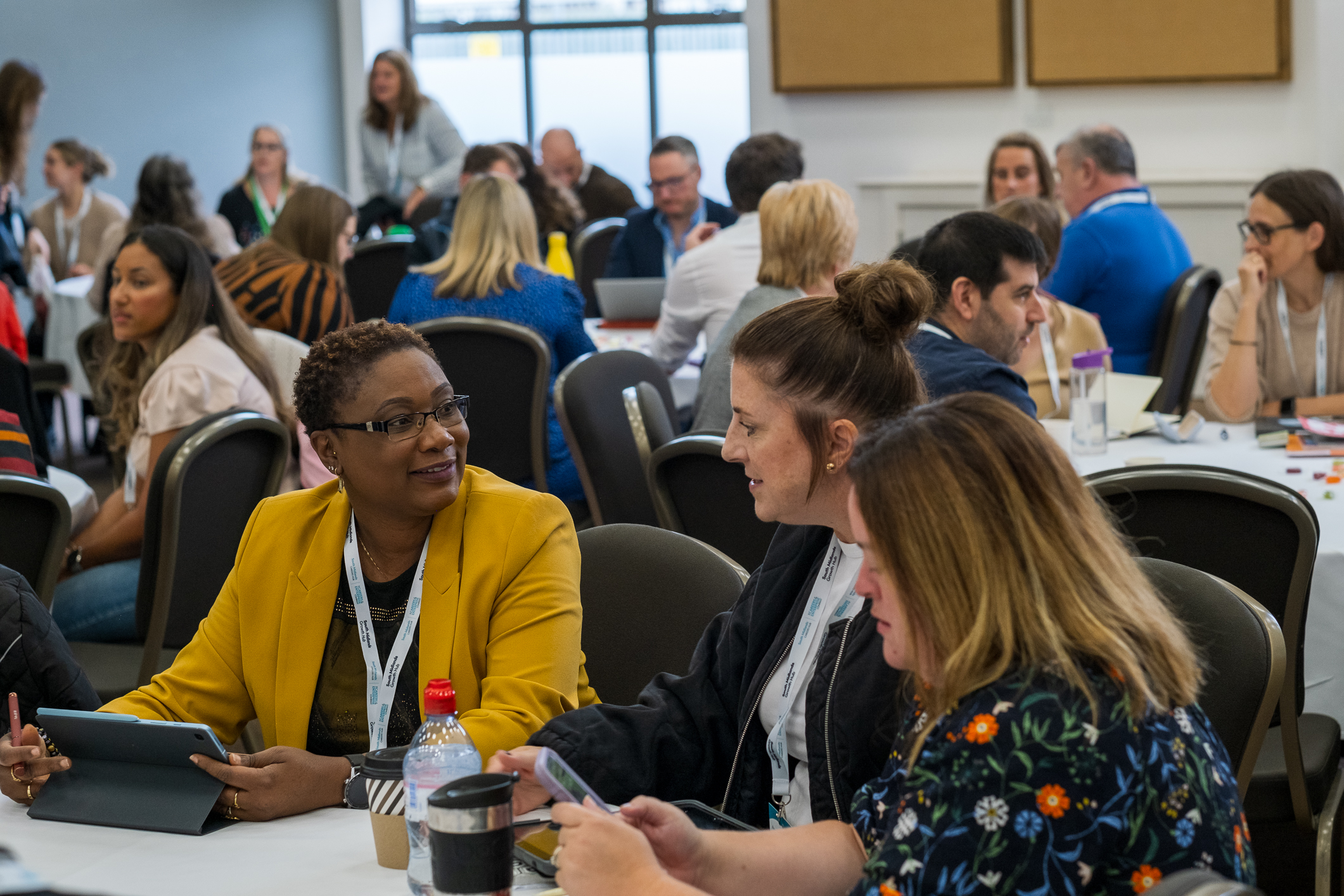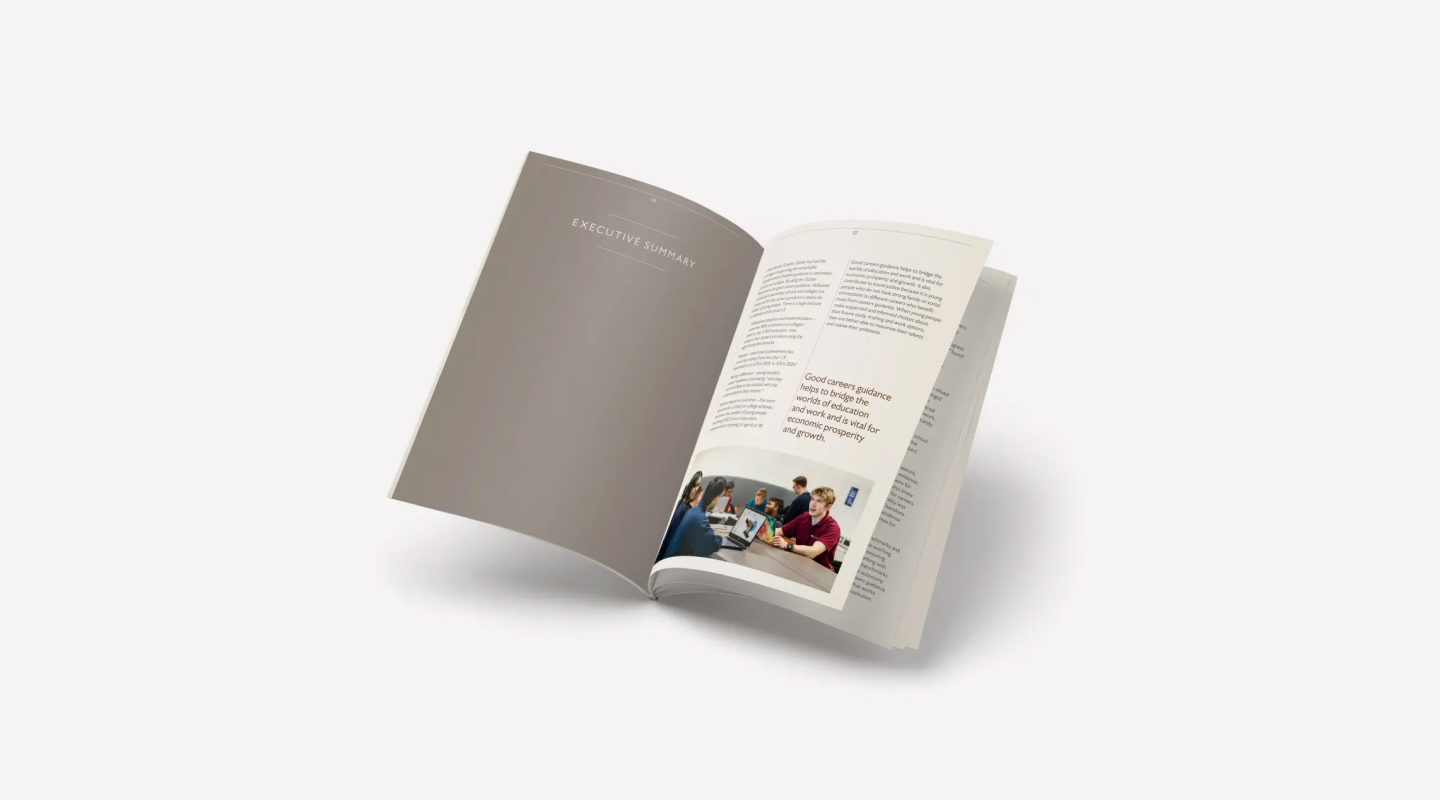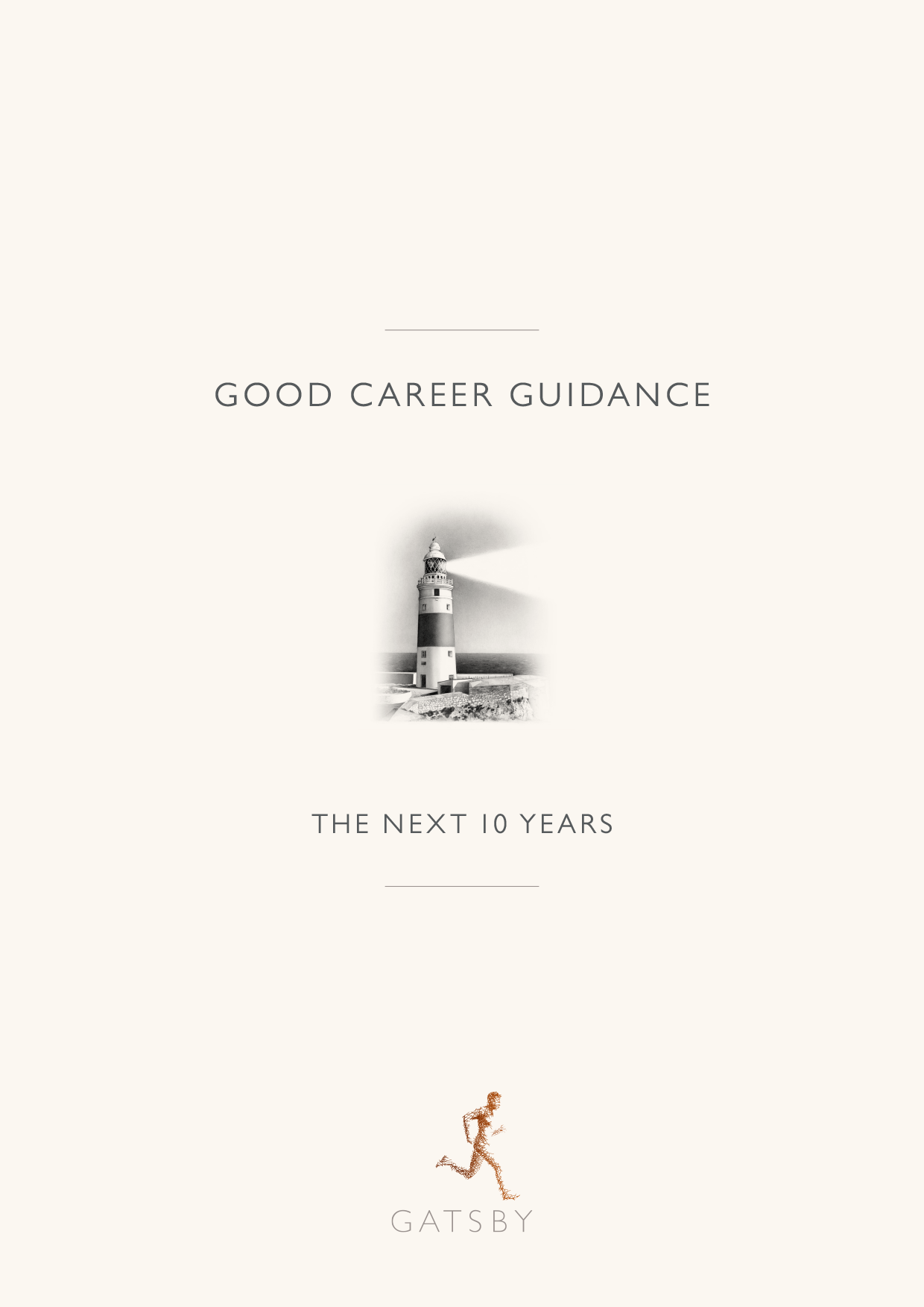A guide toGatsby Benchmark 5
Encounters with employers and employees
Every pupil should have multiple opportunities to learn from employers about work, employment and the skills that are valued in the workplace. This can be through a range of enrichment opportunities including visiting speakers, mentoring and enterprise schemes, and could include pupils’ own part-time employment where it exists.

Criteria for schools
- Every year, from the age of 11, pupils should participate in at least one meaningful encounter with an employer.
Every learner should have multiple opportunities to learn from employers about work, employment and the skills that are valued in the workplace. This can be through a range of enrichment activities, including visiting speakers, mentoring and enterprise schemes, and could include learners’ own part-time employment where it exists.



Criteria for colleges
- Every year, alongside their programme of study, learners should participate in at least two meaningful encounters with an employer. At least one encounter should be delivered through their curriculum area.


Definition of ‘Meaningful’ for Benchmark 5
A meaningful encounter gives the young person the opportunity to learn about what work is like, what skills are valued in the workplace, their recruitment processes and what it takes to be successful. Throughout a careers programme, young people should encounter employers of different sizes and specialisms, including the self-employed, that reflect trends in the labour market, regionally and nationally. These encounters could be in person or a combination of in person and virtual, where appropriate. Both the young person and employers should be supported to prepare for the encounter. Additional or different support may be needed for vulnerable and disadvantaged young people and for young people with special educational needs and disabilities (SEND).
A meaningful encounter will:
- have a clear purpose, which is shared with the employer and the young person
- be underpinned by learning outcomes that are appropriate to the needs of the young person
- have opportunities for two-way interactions between the young person and the employer
- be followed by time for the young person to reflect on the insights, knowledge or skills gained through the encounter
Young people should meet employers of different sizes and observe employees covering multiple roles. They should understand that there are different types of employers and different sized workplaces. We need to focus on developing the future talent.
Employer, Gatsby roundtable
Case Study: Grace Academy
At Grace Academy, all pupils from Year 7 to Year 13 have multiple, carefully planned encounters with employers and employees. These encounters take place both during and outside curriculum lessons. For example, Year 8 pupils meet employers at the Big Bang science event;119 Year 10 pupils interact with employers through curriculum subjects, including employer-led workshops in personal, social, health and economic (PSHE) education lessons; and Year 11 pupils have a mock recruitment and selection event with employers.
A bespoke logbook is shared with each person, showing what workshops they have attended, helping them reflect on the skills they feel they gained.
The school’s enterprise adviser helps arrange employer encounters. This also includes visits to the school from employees from the construction and property services company, Willmott Dixon. They co-deliver industry-relevant lessons on building electronic circuits and problem-solving. Young people can ask them questions about pathways, such as apprenticeships.
The school has built a database of contacts to help them maintain and grow employer relationships.
Case Study: University Technical College, Leeds
University Technical College (UTC) Leeds works closely with employers to understand the skills they value in young people and what they look for during recruitment and selection processes:
One of the core skills we focus on now is oracy. Employers told us how important this is and it’s crucial that our pupils can reflect on their learning, convey their knowledge and understanding, and articulate the skills they have developed.
Headteacher, UTC Leeds
A traditional mock interview day with employers has now evolved to include an online element to reflect modern recruitment practices.
All staff at UTC Leeds are responsible for making links with employers. For example, a local small to medium-sized enterprise (SME) specialising in manufacturing jukeboxes, gives talks to engineering students about the manufacturing process. The students then apply this to their curriculum project work by constructing a jukebox of their own.
In computing, students meet a range of different employees from the digital skills sector. One commented:
Actually meeting the great people that teachers have told us about, from these companies, has really inspired me. I know I’ll look back on my time at this school and say: ‘This is where I became a programmer’.
Year 12 Student


Sector Example: Mentoring by Career Accelerator
Mentoring by employers can have significant impact on some young people. For example, Career Accelerator is a youth organisation that supports young people to prepare for professional careers. They provide employer-led workshops and employer mentoring.
Mentors are carefully chosen and supported so that sessions can be tailored for young people who are neurodivergent or are from diverse, including disadvantaged, backgrounds. Professionals from a range of companies are carefully matched with young people based on their needs. These mentors help young people recognise their value and imagine themselves in a career. They also connect them with a network of employers and other young people.


Sector Example: Speakers for Schools
Speakers for Schools is a social mobility charity that aims “to level the playing field for 11-19-year-olds from state schools and colleges”. They provide encounters with inspirational figures from the world of work through in-person talks and live online broadcasts.
In addition to supporting employer encounters (Benchmark 5), Speakers for Schools also offer employer-led, in-person work placements, as well as virtual or hybrid work experience placements from anywhere in the UK (Benchmark 6).\
Case study: University Technical College (UTC) Leeds
University Technical College (UTC) Leeds works closely with employers to understand the skills they value in young people and what they look for during recruitment and selection processes:
One of the core skills we focus on now is oracy. Employers told us how important this is and it’s crucial that our pupils can reflect on their learning, convey their knowledge and understanding, and articulate the skills they have developed.
Headteacher, UTC Leeds
A traditional mock interview day with employers has now evolved to include an online element to reflect modern recruitment practices.
All staff at UTC Leeds are responsible for making links with employers. For example, a local small to medium-sized enterprise (SME) specialising in manufacturing jukeboxes, gives talks to engineering students about the manufacturing process. The students then apply this to their curriculum project work by constructing a jukebox of their own. In computing, students meet a range of different employees from the digital skills sector. One commented:
Actually meeting the great people that teachers have told us about, from these companies, has really inspired me. I know I’ll look back on my time at this school and say: ‘This is where I became a programmer’.
Year 12 Student
Jump to Benchmark
Gatsby Benchmark 1
A stable careers programme
Gatsby Benchmark 2
Learning from career and labour market information
Gatsby Benchmark 3
Addressing the needs of each young person
Gatsby Benchmark 4
Linking curriculum learning to careers
Gatsby Benchmark 5
Encounters with employers and employees
Gatsby Benchmark 6
Experiences of workplaces
Gatsby Benchmark 7
Encounters with further and higher education
Gatsby Benchmark 8
Personal guidance


Publications
Browse our full collection of downloadable resources, including the reports themselves, associated appendixes and supporting literature.
